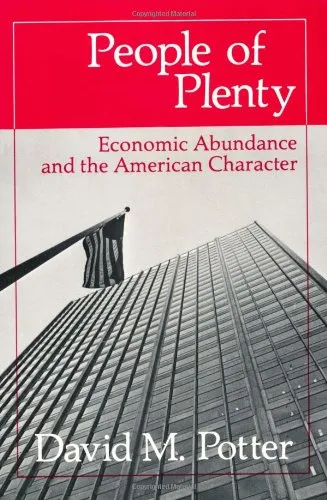People of Plenty: Economic Abundance and the American Character (Walgreen Foundation Lectures)
4.4
Reviews from our users

You Can Ask your questions from this book's AI after Login
Each download or ask from book AI costs 2 points. To earn more free points, please visit the Points Guide Page and complete some valuable actions.Introduction to "People of Plenty: Economic Abundance and the American Character"
David M. Potter's groundbreaking work, "People of Plenty: Economic Abundance and the American Character", combines the art of historical analysis with the precision of cultural critique. This book, a part of the celebrated Walgreen Foundation Lectures series, explores the profound relationship between the economic affluence of the United States and the development of its national character. By dissecting these ties, Potter sheds light on what makes the American psyche uniquely responsive to its economic inheritance, particularly the abundance of resources, opportunities, and material wealth.
Originally written during a period of significant cultural and economic shifts in America, this book provides a nuanced view of how economic forces have shaped ideals, behaviors, and identity. Potter ingeniously weaves together history, sociology, and economics, creating not only a comprehensive narrative of the United States but also an enduring commentary on the deeper cultural implications of its prosperity. For those interested in understanding the country's ethos and the systemic forces that continue to shape its citizens, "People of Plenty" is a must-read.
Detailed Summary of the Book
Potter begins by defining economic abundance as the cornerstone of America's identity since the early days of its formation. He argues that the defining feature of American history is not scarcity, as in many other parts of the world, but rather surplus. This abundance has profoundly influenced the development of American attitudes towards success, freedom, individualism, and even competition. The structure of the book allows readers to explore various key themes that illustrate how material wealth and societal values are interconnected.
One of the most compelling sections of the book is Potter's discussion of how affluence contributes to what he calls "advertising psychology." He explains that economic plenty has led Americans not to merely fulfill their basic needs but also to focus on desire, luxury, and consumerism. This idea is contrasted with the Puritan ethos that initially dominated American cultural values, creating a dichotomy between thrift and extravagance.
Potter also provides deep insights into the paradox of abundance. While economic prosperity has offered Americans unparalleled opportunities, it has also created significant social tensions, particularly when wealth is unevenly distributed. This duality of wealth as both a unifier and divider is threaded throughout the narrative, making "People of Plenty" a textured and thought-provoking study of America’s cultural evolution.
Key Takeaways
- The economic abundance of the United States has played a pivotal role in shaping the American character, and it remains one of the defining themes of its culture.
- Consumerism in America is not simply an economic activity but a cultural phenomenon influenced by advertising and psychology.
- Affluence has fostered opportunities but has also led to inequalities, raising important questions about the ethics and sustainability of prosperity.
- American individualism is deeply tied to economic conditions, shaping not only personal values but societal structures as well.
- The paradox of abundance, which both unites and divides, is central to understanding the complexities of the American experience.
Famous Quotes from the Book
"The American mind has been shaped not so much by what it was forced to overcome, as by what it was free to exploit."
"Where there is abundance, there must also be an illusion of necessity."
"Economic plenty fosters desire as much as it fulfills it."
Why This Book Matters
"People of Plenty" is more than just a history book; it is a key to understanding the American spirit. In a world increasingly dominated by discussions of material wealth, cultural identity, and societal divides, this book remains as relevant today as when it was first published. Its seamless integration of economics, sociology, and history allows readers to witness the interdependence of material and cultural development.
Furthermore, the book challenges readers to question how much cultural traits that seem inherent to the United States are actually products of its unique economic history. As debates about consumerism, social inequality, and sustainability grow louder, Potter’s insights offer a historical context that illuminates how we arrived at this point—and where we could go from here.
For historians, sociologists, economists, and anyone curious about the interplay between wealth and cultural transformation, "People of Plenty" continues to serve as an essential guide to deciphering the unique character of America.
Free Direct Download
Get Free Access to Download this and other Thousands of Books (Join Now)


